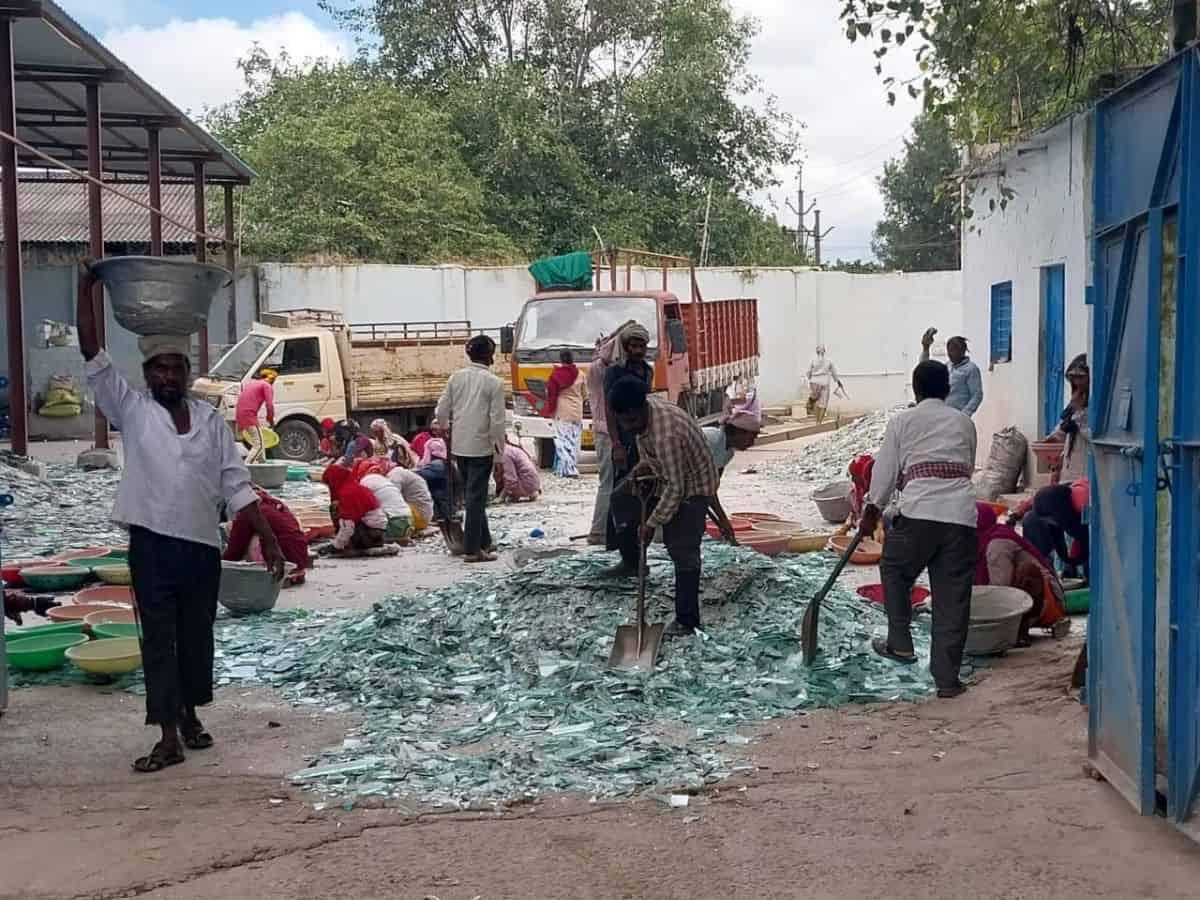Hyderabad: It’s Monday, the first day of a long week. The skies are cloudy and there was a drizzle early today. The winds are quite chilly and sunlight is scarce.
Unmindful of the weather conditions, Reshma Begum, 34 years old, gets ready to head for work. At 8:10 am, she leaves her house at Jahangirabad of Bandlaguda located on the Chandrayangutta to Aramghar road, to head to a local plastic segregation factory. On the way, she is joined by several burqa-clad women, who head to the same destination Alinagar Bandlaguda where two dozen factories are located.
The women work in the factories for a sum of Rs 280 to Rs 320 paid as daily wages for eight to nine hour shifts. At 5:30 pm or 6 pm, they return home to complete household chores and look after their family.
Around 300 women from Jahangirabad, Noorinagar, Milatnagar, Ghousenagar, Fatimanagar and surrounding work at the factories at Bandlaguda. Factories engaged in making plastic seeds out of plastic waste, confectionery and snacks are located in Bandlaguda. Some factories had shut down and the land sold to realtors who converted it into apartments.
About Reshma Begum, she is a mother of two and her husband works as a labourer. “He (husband) does not get work on a daily basis at the ‘labour adda’. So I must chip in. Together we run the house otherwise, it is difficult,” the woman said.
Not all women working here are lucky. Many of them are either divorced or their husbands passed away at an early age. Ruksar Begum lives along with her three children and mother at Jahangirabad in a rented room.
“I do two jobs. During the day I work in factories and at night whenever I get a call I head to some function hall and work as a waitress. Life is tough and somehow we manage things,” she told Siasat.com.
The factories located in Bandlaguda are a lifeline for several families who are locals of Telangana and migrants from Maharashtra, Karnataka, Bihar, Uttar Pradesh and Jharkhand.
The women spend a considerable part of their earnings paying the house rent and buying groceries. “We don’t save anything. Absolutely nothing. If someone in the family falls ill, we just borrow money and pay the hospital bills,” said Tabassum, a 40-year-old widow.
With literacy levels low, women can’t risk taking up some other jobs. “Elderly women did not even go to school while the younger women had attended school till Seventh or Ninth Standard at their native place,” said Sajida Begum, a housewife.
Women workers at Katedan factories
Two kilometres away from Bandlaguda lies the Katedan Industrial Area, one of the oldest industrial estates on the outskirts of Hyderabad.
In around 100 small and big factories located here, several women work. The women are from Bihar, Uttar Pradesh, Madhya Pradesh, Karnataka and Maharashtra.
In big factories, women work in biscuits, plastic plates, baskets, edible oil packets, snacks, paper products and other articles. Muskaan, who had completed her ninth standard from a school in Maharashtra works at a biscuit factory along with his sister. Two siblings along with a friend Priya, join them en-route and the trio walk a distance of roughly three kilometres from Padmashali colony Madhuban to Katedan daily for work.
“We have to work for two reasons. One to run the household expenses and the other to save some money for our future. All the four members of our family work,” said Muskaan.
The same is the case with Priya, whose parents and brother work at different places. “Earning is compulsory for survival,” she precisely said when asked why she did not study.
The families buy groceries on a weekly basis and the vegetables are not sold in measure of kilograms in the local markets. “People buy vegetables to prepare one or two times meals. So three or four tomatoes and potatoes are enough and we sell it for Rs 10 to them,” said a vegetable vendor.
The local government machinery does not seem to be doing enough to help them with proper education for their children, health facilities and basic amenities.
“Every amenity comes for a price. No social worker or organization does things to improve our standards. We see individuals helping people after taking their photographs and videos so we don’t approach anyone for help,” said Sajida, a single mother of three children.







